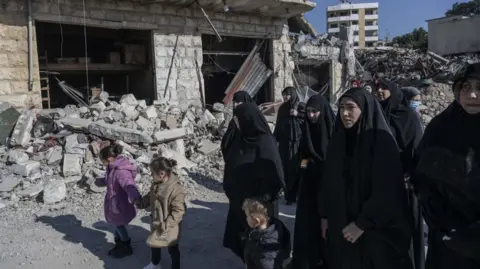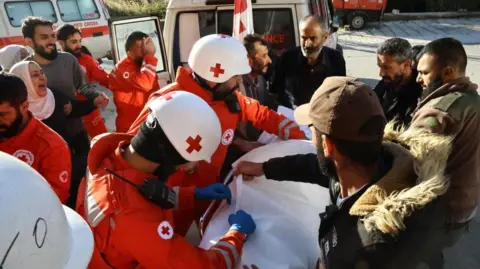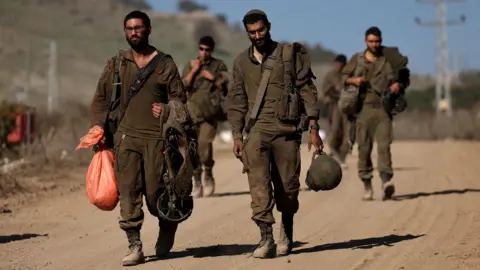Israeli and Hezbollah strikes test limits of ceasefire
 Getty Images
Getty ImagesThe latest exchange of fire between Israel and Hezbollah is testing the limits of last week’s already fragile ceasefire deal.
Hours after Hezbollah fired two mortar shells at an Israeli military outpost on Monday, Israel carried out its largest series of air strikes since the truce came into effect.
Nine people were killed in two villages in southern Lebanon.
“Yesterday was the most dangerous moment for the cessation of hostilities,” said one seasoned observer in Lebanon.
The Israeli military said it targeted Hezbollah fighters, rocket launchers and infrastructure. However, in a statement it added, that: “The State of Israel remains obligated to the fulfilment of the conditions of the ceasefire agreement in Lebanon.”
Both sides have accused each other of violating the truce brokered by the US and France in recent days.
Under its terms, Israel is prohibited from conducting offensive military operations in Lebanon while Lebanon must prevent armed groups, including Hezbollah, from launching attacks on Israel.
The Israeli army did not report any casualties from the mortar attack on its position in the sensitive Shebaa Farms area – along the border of Lebanon and the Israeli-occupied Golan Heights.
However, soon afterwards, Israel’s Prime Minister Benjamin Netanyahu vowed a “strong” response.
There were also fiery comments from the Defence Minister, Israel Katz: “If the ceasefire collapses, there will no longer be an exemption for the state of Lebanon,” he said on Tuesday.
“We will enforce the agreement with maximum response and zero tolerance; If until now we have separated Lebanon and Hezbollah - it will not be anymore".
 Getty Images
Getty ImagesHezbollah said its mortar attack – the first operation which it had announced since the ceasefire came into effect last Wednesday – was a “warning” in response to repeated violations by Israel.
It launched the missiles after Israel fired artillery shells and conducted at least four air strikes that killed two people, Lebanese media reported: a person on a motorbike and a member of the Lebanese security forces.
In a statement Hezbollah this was a defensive move “given that appeals to the relevant authorities to stop these (Israeli) violations have proven futile,” an apparent reference to an international committee meant to monitor the truce.
“This is an affirmation that the party remains strong and ready for any developments,” says Kassem Kassir, a Lebanese political writer specialising in Islamist movements.
“The key lies in activating the work of the international committee, ensuring the deployment of the Lebanese army, the withdrawal [of Israeli forces] from occupied Lebanese territories, and halting Israeli violations.”
Paula Yaacoubian, an independent member of Lebanon’s parliament, said Hezbollah probably fired the missiles to send a message.
“I think it can be just to tell Israel ‘we’re still here, and we can still fire’, so that Israel stops [its attacks],” she told the BBC. “It’s becoming embarrassing to Hezbollah to get all these violations and not even respond with anything.”
Ms Yaacoubian said the question of whether the war will resume “is in the hands of Israel, not Hezbollah.”
“I think Hezbollah needs to gather its forces together, to see where the region is heading,” she added.
Lebanon’s parliamentary speaker, Nabih Berri, a Hezbollah ally who represented his country in truce talks, said at least 54 ceasefire breaches by Israel had been recorded. He said these included air strikes, demolishing homes near the border and violating Lebanese airspace.
He urged the monitoring commission to “urgently” ensure that Israel adhere to the deal.
Israel says its strikes are a response to Hezbollah violations allowed under the terms of the agreement. Its foreign minister, Gideon Saar, has accused Hezbollah of taking the prohibited step of moving weapons south of the Litani River.
Much now depends on the international committee which is meant to verify claims of ceasefire breaches and facilitate communication between the parties.
 EFE/REX/Shutterstock
EFE/REX/ShutterstockIt will be co-chaired by a US army general, Jasper Jeffers, who arrived in Beirut last week, and Amos Hochstein, the senior advisor to President Joe Biden who was a key player in negotiating the truce.
The committee also includes representatives from France, the Israeli and Lebanese militaries, and the United Nations Interim Forces in Lebanon (Unifil).
It is still getting organized, but the BBC understands the aim is to have all the members in place later this week so that it can hold its first meeting.
On Monday, Biden administration officials focused on the success of the truce.
“Largely speaking… the ceasefire is holding,” said White House national security spokesman, John Kirby.
“We went from hundreds of rocket attacks to basically zero by Hezbollah and dozens of air strikes by Israel to one or two a day. So there’s been a dramatic reduction in the violence.”
He summed up: “There’s a lot of work to do.”
Additional reporting by Rawad Salameh
